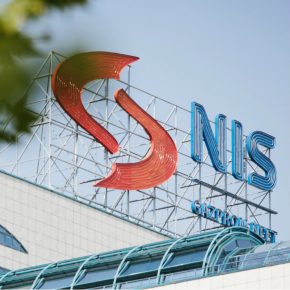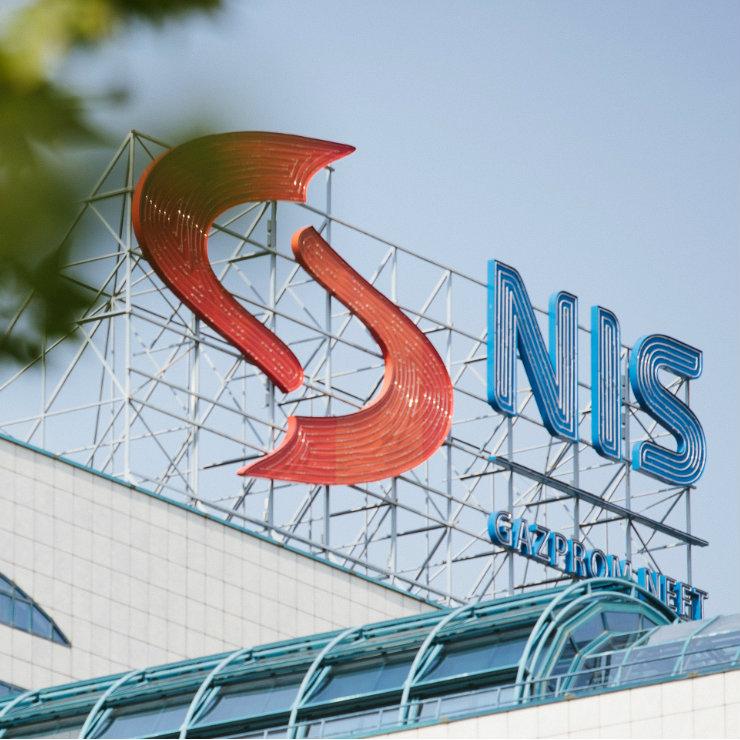Tydzień w gospodarce
Category: Trendy gospodarcze
Analyst, journalist specializing in the Western Balkans and Middle East domestic and foreign affairs

NIS headquarters, Novi Sad, Serbia (NIS, Public domain)
NIS significantly contributes to the Serbian budget for payments based on taxes and dividends, and keeps the social peace. In the period up to 2025, the growth of EBITDA indicators is planned at an average of 4 per cent annually. NIS is owned by Gazprom, which has a 56.15 per cent stake and the Republic of Serbia with 29.87 per cent of shares. The rest belongs to citizens, employees, former employees and other minority shareholders.
By 2025, a comprehensive investment program of USD2.2bn is envisaged, with NIS remaining at the top of the list of the largest domestic investors. The company will invest in projects in Serbia and the region that have the maximum effect on total business. The project of modernization of refinery plants, that is, the project for increasing the depth of the refining of the Pančevo Oil Refinery, remains a key project for NIS in the next period. The realization of this project, worth more than EUR300m, will enable additional diversification of the product range with products with higher yields but also to provide market supply to high quality fuel, which will contribute to the energy stability of Serbia. It has been announced that the commercial operation of the deep processing plant with delayed coking technology will begin to work in the third quarter of 2019.
The adopted development strategy points out several priority projects for NIS: increasing the depth and efficiency of processing in the Pančevo Oil Refinery, preserving the indicators of oil and gas production and the growth of hydrocarbon reserves, as well as formatting and modernization of the retail network. Also, the strategic goals continue to expand business through investments in generating electricity, as well as retaining the leader position for efficiency in the region, with full optimization of operational performance.
NIS’s General Director Kiril Tyurnevyev said that the long-term goal of NIS is to become the leading energy company in the region of Southeast Europe. „Today, NIS is the largest and most efficient company in Serbia, one of the key energy players in the Balkans. I am sure that the long-term strategy of NIS will ensure that in the future the company’s competitive ability in the markets of Eastern Europe is enhanced, and the realization of strategic projects of the company will enable increase of profitability of business for shareholders „, said the NIS’ Chairman of the Board and the t Deputy General Director of Russian Gaspromneft Vadim Yakovlyev.
Defining the strategic directions of development, NIS took into account the real circumstances in which the Block Research and Production has been operating for a long time. Therefore, the newly developed strategy in the Block Research and Production envisages the implementation of a series of activities on the development of the resource base and the implementation of the drilling program and geological and technical measures. The focus is on profitable investment projects in Serbia and the region, which have the maximum effect on total business.
The strategic goals of Block Processing are, among others, improvement of energy efficiency and continuous growth of processing efficiency. The project of modernization of Oil Refinery Pančevo plants is worth more than EUR300m, and it will enable additional diversification of the product range to products with higher yields, as well as ensure the supply of the market to high-quality fuels, which will contribute to the energy stability of Serbia.
Block Promet will continue to invest in modernizing, developing and improving the efficiency of the retail network, as well as increasing market share in the region. In the following period, NIS will also devote itself to the development of business lines of specialized products – air fuels, lubricants and fuel bunkers – through raising the level of specialized logistics and improving the quality of products and related services.
In the domain of energetics, NIS will diversify its business through investments in electricity generation. The key projects in this business segment will be the construction of a new thermal power plant (PPS) Pančevo, further growth of electricity generation from cogeneration and the development of a wind turbine project. One of the main focuses is also the improvement of the energy efficiency system, which implies the rational use of available resources.
The development strategy marks growing influence of the Russian petroleum business in the Balkans. The Russian companies own large parts of the petroleum products market in Bulgaria, where the share of Russian investments exceeds 22 per cent of GDP in the period from 2005 to 2014. This is a clear sign of a strong economic influence, with an assessment of the high risk of countries being fully aligned with the Russian interest sphere. Russian companies, together with Kazakhstan, have a majority stake in Romanian oil capacity, while the American attempts to diversify this segment are now unsuccessful.
Thus, the Russian oil company Lukoil is most prominent in delivering crude oil, while Gazprom dominates the natural gas market. This fact certainly strengthened the significance of South-East Europe as a transit corridor for supplying Western Europe with energy from Russia, and at the same time influences the countries of the region, which fully aligned their policies with the demands of the United States and the European Union, finally taking into account the geopolitical interests of Russia. Already in 2007 the Republic of Srpska sold more than 60 per cent of the local NIRS to Russia’s NeftgazInKor, allowing the Russians to gain control over the complete infrastructure, i.e. oil refineries and gas station network. In 2008, Serbia sold 51 per cent of NIS shares to Gazprom, which enabled this company to advance the dominant position in the supply of energy and their distribution in Serbia. Furthermore, ownership in NIS enables Russia to control other strategic sectors, such as the chemical industry (HIP Petrochemicals).
Vedran Obućina is an analyst and a journalist specializing in the Croatian and Middle East domestic and foreign affairs. He is the Secretary of the Society for Mediterranean Studies at the University of Rijeka and a Foreign Affairs Analyst at The Atlantic Post.

